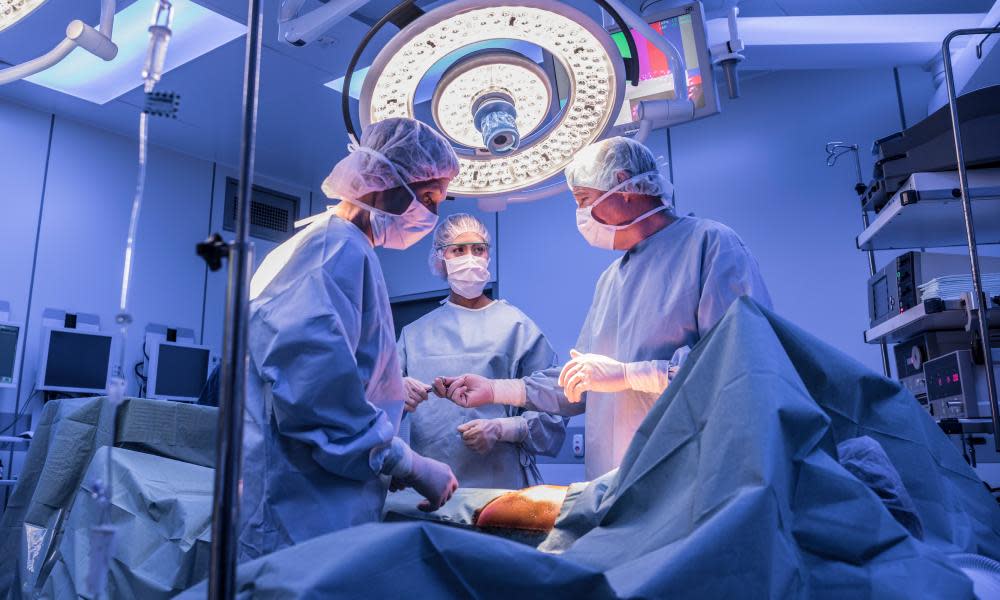Covid: unnecessary precautions causing NHS surgery backlog

Thousands of patients may be facing unnecessary long waiting times for surgery because of a misplaced assumption about the Covid-19 risk posed to healthcare staff by a routine procedure, a study has found.
For months, operating theatres have been running at reduced capacity, leading to some of the longest waiting lists for surgery since records began. A major reason has been the introduction of precautions to protect against the airborne transmission of coronavirus via tiny droplets called aerosols during the insertion and removal of the breathing tube that is placed in patients’ airways while they are under general anaesthesia.
This risk was judged so high that they have been classified as “aerosol generating procedures” (AGPs) for which respirators and high-level personal protective equipment (PPE) are required, and surgery must pause while the operating room is cleared of aerosols and special cleaning is undertaken.
Yet, despite the presumed risk, no direct measurements of aerosols have ever been made. Now a study suggests these additional precautions may be unnecessary.
Dr Jules Brown, an anaesthetist at North Bristol NHS trust, and his colleagues measured the airborne particles produced during these routine surgical procedures in patients who were undergoing urgent orthopaedic or neurosurgery in an ultra-clean operating theatre.
They found that inserting the breathing tube (intubation) produced barely any aerosols, and although removing it (extubation) did generate more aerosols if the patient coughed, which sometimes happens as their natural breathing reflexes return, the amount was barely a quarter of that produced by a normal voluntary cough.
They also studied procedures such as suction of the airway and “mask ventilation” – when the anaesthetist takes over the patients breathing before tube insertion – and found these also produced barely any aerosols. The study was published as a preprint and is set to appear in the peer-reviewed journal Anaesthesia on Tuesday.
“These findings should trigger a debate about the need for the current enhanced measures to protect against airborne spread in operating theatres,” said Prof Tony Pickering at the University of Bristol, who was also involved in the study. “If a de-escalation of the protective measures was enacted, which our findings support, then this could greatly improve our ability to deliver healthcare to patients within the NHS and internationally, which is important as winter is coming.”
Dr Andrew Klein, a cardiothoracic anaesthetist at Royal Papworth Hospital in Cambridge, and editor-in-chief of the journal Anaesthesia, said current precautions meant there had been a reduction in capacity for surgical procedures of about 50%. He cautioned that additional precautions would still be necessary for lung, ear, nose and throat surgery, but for approximately 95% of operations the restrictions could potentially be relaxed, increasing capacity.
“Other scientists will want to replicate this study, but if the findings are true, it will change policy and the way we conduct surgery completely,” he said.
“If mask ventilation, tracheal intubation and extubation are not counted as aerosol generating procedures, it will save at least 20 minutes per operation on a patient who has or may have Covid-19,” said Prof William Harrop-Griffiths, vice-president of the Royal College of Anaesthetists. “With more than 3m anaesthetics normally being given for surgery every year in the NHS, as a rough estimate, I would think that this change might benefit tens of thousands of NHS patients in the next year. It would also lead to cost savings in PPE.
“Although anaesthetists will still need to take infection precautions and be careful when they anaesthetise patients who have – or may have – Covid-19, this new information will be of considerable value in protecting patients and those who look after them, while reducing the equipment, time and cost needed to deliver safe care.”
He added that the results would be brought to the attention of the new and emerging respiratory virus threats advisory group (NERVTAG), which advises the chief medical officer. Public Health England declined to comment on whether guidance on aerosol generating procedures would change as a result of the research.


